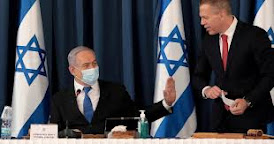US President Joe Biden has appointed a strong and
experienced team, among them half of Jews, one wonders if there has ever been a
more Jewish US administration. Here are the 15 Jews who comprise Biden’s team.
It is believed that a vigorous American presence in world affairs, spearheaded
by the Jewish team, is in Israel’s long-term interest, more than an ‘America
first’ which makes the US largely irrelevant in global affairs.
• Antony Blinken,
Secretary of State, is a veteran career diplomat. His stepfather, Samuel Pisar,
was the only Holocaust survivor of some 900 children in his Polish school. He
was rescued after fleeing from a Nazi death march and finding refuge in a US
armed corps tank – an episode Blinken recounted movingly when Biden introduced
him.
• David Cohen,
Deputy CIA Director returns to this role after filling it from 2015 to 2017.
Cohen is the son of a prominent Boston Jewish physician.
• Janet Yellen,
Secretary of the Treasury is the first woman to fill this role; previously, she
headed the Federal Reserve Board of Governors. A 2016 Trump attack ad featured
three Jews, including Yellen, and reflected anti-Semitic tropes. She is a
renowned labor economist.
• Merrick
Garland, Attorney-General was blocked from becoming a Supreme Court Justice
by then-Senate majority leader Mitch McConnell, in the last year of the Obama
presidency. After being nominated Garland spoke of his grandparents, who fled
antisemitism in Europe and moved to the US.
• Avril Haines,
Director of National Intelligence was deputy director of the CIA under Obama,
the first woman to hold this job. Her mother was a well-known Jewish painter,
Adrian Rappin (Rappaport) and Haines identifies with Israel; she visited Israel
with her non-Jewish father.
• Ron Klain,
Chief of Staff was also Biden’s chief of staff in his vice presidential days.
Klain speaks of his childhood synagogue in Indianapolis, where he learned
multiple Torah portions for his bar mitzvah, and of his commitment to raising
Jewish children.
• Eric Lander,
Director, Office of Science & Technology Policy is a leading geneticist.
His position has been elevated to Cabinet level. Lander has spoken of being the
subject of antisemitic criticism by James Watson, discoverer of the DNA double
helix.
• Rachel Levine,
Deputy Secretary, Health and Human Services grew up in a Conservative Jewish
home in Massachusetts. She is the first open transgender person to be nominated
for a position requiring Senate confirmation.
• Alejandro
Mayorkas, Secretary of Homeland Security was the Deputy Secretary of
Homeland Security under Obama. He was born in Cuba, to a Cuban Jewish father
and Romanian Jewish mother who survived the Shoah. He has worked closely with
Jewish groups in the past.
• Anne Neuberger,
Director of Cybersecurity, National Security Agency is an Orthodox Jew, from
Brooklyn, educated through college in Orthodox schools. She helped establish
the US Cyber Command and led security efforts in the 2018 midterm elections.
Her grandparents are Holocaust survivors and her parents were among the
passengers on the Air France flight in 1976, kidnapped to Uganda and rescued in
Israel’s Entebbe operation. She founded Sister to Sister, an NGO that serves
single mothers across the US.
• Wendy Sherman,
Deputy Secretary of State was born in Maryland to a Jewish family. Her father
served in the Marines. She is the first woman to be appointed Deputy Secretary
of State. A career diplomat, she was the lead negotiator for the controversial
Iran nuclear deal.
• Jeff Zients,
COVID-19 Coordinator was born in Washington, DC, and was raised in Kensington,
Maryland. His family is Jewish. From 2014 through 2017 he was the director of
the National Economic Council. He will fill the crucial role of directing and
coordinating efforts to overcome the COVID-19 pandemic.
• Rochelle
Walensky, Director, Center for Disease Control and her husband are members
of Temple Emanuel, in Newton, Massachusetts, a prominent Conservative
synagogue. She is an expert on AIDS and HIV and served as Chief of Infectious
Diseases at Massachusetts General Hospital, and professor at Harvard Medical
School.
• Jared
Bernstein, member, Council of Economic Advisors was the chief economist and
economic adviser to Biden under Obama.
• Douglas Emhoff
is husband of US Vice President Kamala Harris. He is the first-ever
husband of a US Vice President to enjoy a key position. He was born in
Brooklyn, son of Jewish parents Barbara and Michael Emhoff. He grew up in New
Jersey. He is an entertainment lawyer and teaches at Georgetown University Law
Center.






